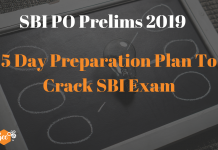Preparing for the NABARD Grade A exam requires a well-structured plan, and one section that can significantly impact your score is General Awareness (GA). Despite carrying only 20 marks, this section often decides whether aspirants cross the cut-off or fall short.
This blog provides a complete strategy to prepare for the General Awareness section in NABARD Grade A Phase 1. It covers the exam pattern, preparation techniques, important topics, and smart study methods that can help aspirants maximize their marks.

Why General Awareness Matters in NABARD Grade A
General Awareness is a merit-based section and directly influences your final score in NABARD Grade A Exam. While sections like reasoning and quantitative aptitude are qualifying in nature, General Awareness contributes to the overall cut-off.
Scoring well in GA can make a significant difference in your final merit. Even if your performance in other sections is average, a strong GA score can improve your chances of success.
A safe target for General Awareness is generally considered to be 10–12 marks, based on previous years’ cut-off trends. This demonstrates that GA is not just another section, but a key scoring opportunity
NABARD Grade A Phase 1: Exam Pattern Overview
To prepare effectively, it is important to understand the exam structure. General Awareness is one of several sections in Phase 1, but it is a merit-based section and directly influences your ranking. The table below gives a clear overview of all sections and their weightage:
| Section | Marks | Nature |
| General Awareness | 20 | Merit-based |
| Reasoning | 20 | Qualifying |
| Quantitative Aptitude | 20 | Qualifying |
| English | 20 | Qualifying |
| Computer Knowledge | 20 | Qualifying |
| Decision Making | 10 | Qualifying |
| Economic & Social Issues (ESI) | 40 | Merit-based |
| Agriculture & Rural Development (ARD) | 40 | Merit-based |
From the table, it is evident that General Awareness, ARD, and ESI are the sections that can help improve your merit position, making them critical areas of focus during preparation.
Static vs. Current Affairs in General Awareness
General Awareness questions are divided into two broad categories: Static and Current Affairs. The static portion covers information that rarely changes, while the current affairs portion tests your knowledge of recent events. Both types of questions are equally important, and aspirants should focus on balancing their preparation.
The following table summarizes the two portions:
| Portion | Description | Examples |
| Static GA | Permanent facts that do not change | Headquarters of organizations, establishment dates, schemes, national parks, capitals |
| Current Affairs | Dynamic updates from the last 6–8 months | National and international events, banking news, ARD updates, defense, science & technology, sports, awards |
It is important to note that questions are derived from both static and current affairs, and a thorough understanding of both ensures a better chance of scoring high in GA.
Smart Preparation Insights for General Awareness
A strategic approach can make a significant difference in your General Awareness score. Here are key preparation tips for you:
- Treat General Awareness as High-Return Section: Even though it carries only 20 marks, dedicating focused daily time to GA can significantly boost your overall merit.
- Balance Static and Current Affairs: Cover both static topics such as headquarters, taglines, schemes, and reports, along with current affairs from the last 6–8 months for complete preparation.
- Integrate with ARD and ESI: Many GA questions overlap with Agriculture & Rural Development (ARD) and Economic & Social Issues (ESI). Studying these together saves time and enhances understanding.
- Use Multiple Reliable Resources: Refer to updated PDFs, BeePedia mobile apps, curated Telegram groups, and expert notes or classes on banking, finance, ARD, and static GK to avoid missing important topics.
- Maintain Organized Notes: Keep a dedicated notebook for GA with separate sections for schemes, reports, awards, static GK, and current affairs to simplify revision.
- Combine Related Topics: Interlinking topics, such as studying ARD current affairs along with GA, helps cover more material efficiently and reduces repetition.
- Focus on Recent Developments: Prioritize important appointments, international summits, awards, sports events, Union Budget and new government schemes. Be ready for questions from unexpected areas.
- Revise Before Mock Tests: Revisiting notes before attempting NABARD Grade A mock tests improves recall, accuracy, and performance in mock exams.
- Pay Attention to Minor Details: Taglines, organization HQs, and notable personalities are often tested. These easy-to-remember details can make a big difference in scoring.
- Update Notes Regularly: Current affairs change continuously, so regularly update notes, track PDFs, and mark completed materials to avoid duplication and save study time.
Revision Strategy for General Awareness
Effective revision is key to retaining information and performing well in the exam. A structured approach can help aspirants cover the syllabus efficiently.
A daily review of notes for 15–20 minutes helps in retaining recent topics. Weekly compilation and revision of all notes ensures that information is reinforced regularly. Mock tests should be attempted only after revising notes to improve accuracy. During the last month before the exam, aspirants should focus solely on revision and avoid introducing new materials.
Sample 4-Week General Awareness Study Plan
A structured plan can help aspirants cover all important topics and revise effectively before the exam. The following table outlines a sample 4-week study schedule:
| Week | Focus Area | Activities |
| Week 1 | Static GA and Banking | Revise headquarters, schemes, and RBI updates |
| Week 2 | Current Affairs (last 2 months) | Cover appointments, awards, and sports |
| Week 3 | ARD and ESI Current Affairs | Integrate ARD schemes with GA topics |
| Week 4 | Revision and Mock Tests | Revise notes and attempt 3–4 mock tests |
Key Takeaways
General Awareness is a scoring section that can significantly impact your merit. Aspirants must cover both static and current affairs thoroughly. Maintaining organized notes facilitates easy and efficient revision.
Integrating GA with ARD and ESI allows for better retention and saves study time. Regular revision and attention to minor details such as taglines, headquarters, and personalities can make a difference. Finally, consistent preparation is crucial, even if exam notifications are delayed, to maintain readiness and confidence.
Summing Up
The General Awareness section in NABARD Grade A Phase 1 carries only 20 marks but has a strong impact on overall merit. By preparing both static and current affairs, organizing notes efficiently, integrating overlapping subjects, and revising regularly, aspirants can maximize their score.
Starting preparation early, staying disciplined, and following a structured approach are the keys to success. With consistent effort and smart study techniques, aspirants can achieve their goal of performing well in the General Awareness section and securing their place in the merit list.
Consistent preparation combined with smart strategy and regular revision forms the formula for success in the NABARD Grade A General Awareness section.
ixamBee specializes in providing expert guidance and resources for banking exams 2025, ensuring that you are well-prepared for the Upcoming Bank Exams like RBI Grade B, NABARD Grade B, IBPS SO, and more. Our courses align with the bank exam calendar 2025, covering all the essential topics. With a focus on the upcoming bank jobs, our Previous Year Papers, BeePedia, SSC CGL, SSC CHSL, SSC MTS and other Mock Tests are designed to help you excel in upcoming banking exams.
Also Read:
7 Biggest Myths About NABARD Jobs – Busted!
Regulatory Body Exams in 2025: Strategic Preparation Guide for Aspirants
NPCI’s Latest Guidelines: What Banking Aspirants Must Know for 2025















